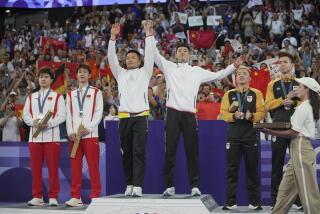Beijing Should Get Over Its Taiwan Tantrum
- Share via
Won’t anyone say something nice about Taiwan?
Sure, it made a big blunder. With the People’s Republic of China about 100 miles away, Taiwan has to be exceptionally cautious about throwing its weight around. This island society, scarcely the size of Maryland, has more than its share of enemies, not to mention indifferent friends. Only a handful of nations, understandably, even recognize it as an official state. Worse yet, Taiwan’s president, Lee Teng-hui, seems lately to get Taiwan into trouble almost every time he opens his mouth, a foot-in-mouth syndrome that’s obscuring a record of great political and economic accomplishment.
The diplomatic debacle started July 9 when Lee declared the usefully foggy 50-year formula of “one China” invalid and declaimed that henceforth Taiwan would relate to Beijing on a “special state-to-state” basis. One doesn’t need a doctorate in foreign relations to know this would go over with the ultra-ultra-touchy leaders in Beijing about as well as stationing a new U.S. missile system in Taiwan. Beijing has threatened to invade if Taiwan were to declare formal independence, which is almost what Lee did.
Indeed, unless the hidden goal was to drive Washington ever more firmly into the embrace of Beijing, Lee’s retreat from the “one-China” formulation must, at this point at least, be assessed as a faux pas. The U.S. reaction was telling. Without missing a beat, President Clinton jumped on the hotline to Beijing to commiserate over the new tension caused by Taiwan, and to wax nostalgic with Jiang about the enduring value of the “one-China” formula. They even agreed to spend some quality time with each other this September at the Asia Pacific Economic Cooperation summit in New Zealand. Clinton pointedly shelved a planned visit of Pentagon officials to Taiwan that Beijing had been complaining about. And in case Lee still didn’t get the U.S. message, Secretary of State Madeleine Albright exchanged public toasts with Chinese Foreign Minister Tang Jiaxuan in Singapore. Not since March 1996, when China’s People’s Liberation Army began lobbing test missiles, has Taiwan had such a dark month.
It’s at this point that I begin to feel sorry for Taiwan. It’s not easy living in the shadow of a giant that’s more impoverished than you, not just economically but politically as well. Taiwan has one of the best economies in Asia, and one of the healthiest polities. And consider that in little more than 10 years, this dramatic and welcome democratization occurred, thanks in part to the skillful engineering of Lee, as chairman of the ruling Kuomintang, or Nationalist Party, as well as Taiwan’s elected president. This, more than the foot-in-mouth blunders, is what Lee will long be cherished for.
Remember, too, that without Taiwan’s political liberalization, its economic rejuvenation might never have occurred. This island of 23 million people--consisting of exiles from the mainland as well as native-born Taiwanese--has built itself an amazingly muscular economy. It has, so far at least, avoided the undertow of the still-dangerous Asian financial crisis with a maneuverability that astonishes even the financial experts.
More than 10 years ago, a Chinese journalist, Guo Yi-dong, wrote “The Ugly Chinese People.” This famous book satirically made fun of the colossal economic and political failures of the Chinese people, on both sides of the Taiwan strait. But just a decade later, so much had changed on the Taiwan side that Bo Yang, as he is better known, came to anoint Taiwan as the freest society in all the many centuries of Chinese history. One can only hope that the Chinese people on the other side of the strait are not too many decades behind. Instead of wishing to threaten Taiwan, the mainland should ignore the unfortunate diplomatic ravings of its aging but proud leader and focus on getting its own economic and political fundamentals right. This, after all, is what Taiwan has been doing--and doing so well. China is big enough and farsighted enough to avoid Lee’s taunts and get on with its historic business. That would not only help Taipei but Beijing as well.
Perhaps the unification of greater China will come someday. But not tomorrow, and not soon. Beijing has to get real, too.
More to Read
Sign up for Essential California
The most important California stories and recommendations in your inbox every morning.
You may occasionally receive promotional content from the Los Angeles Times.













